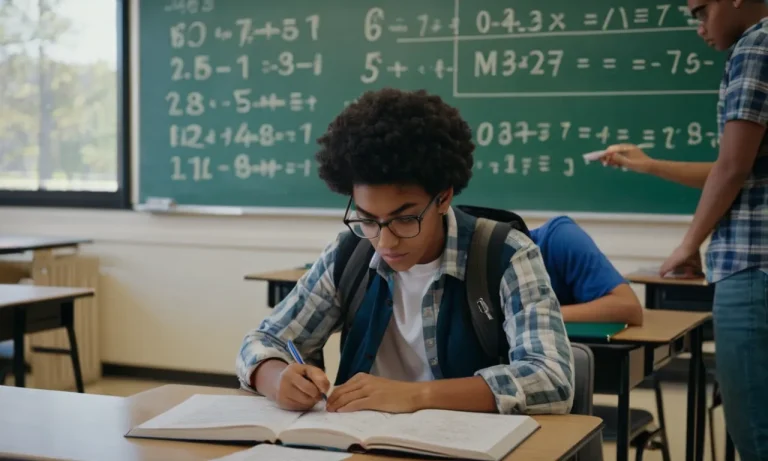Choosing the right educational path for your child is a crucial decision that can shape their future. As parents, we want to ensure that our children receive the best possible education, and one of the key considerations is whether to enroll them in a private or public school.
However, a common question that arises is: Do private schools have to follow state guidelines?
If you’re short on time, here’s a quick answer to your question: Private schools are generally exempt from following many state guidelines and regulations that govern public schools. However, they must still comply with certain basic requirements, such as health and safety standards, anti-discrimination laws, and curriculum standards for core subjects like math, science, and English.
In this comprehensive article, we will delve into the intricacies of private school regulations, exploring the extent to which they must adhere to state guidelines, the areas where they have more autonomy, and the potential implications for students and parents.
We will also discuss the variations in regulations across different states and provide insights into the advantages and disadvantages of private school autonomy.
Understanding State Guidelines for Private Schools
Private schools in the United States are not bound by the same regulations as public schools, but they still have to adhere to certain state guidelines. These guidelines help ensure that private school students receive a quality education that meets basic standards.
The level of oversight and specific requirements can vary from state to state, so it’s important for private schools to stay informed and compliant.
Basic Requirements for Private Schools
Most states require private schools to meet the following basic requirements:
- Obtain a license or accreditation from the state
- Maintain records of student attendance and progress
- Provide a minimum number of instructional hours or days per year
- Comply with health and safety codes, including fire safety regulations
- Conduct background checks on staff and faculty
According to the Private School Review, some states have additional requirements, such as mandating the teaching of specific subjects or providing services for students with disabilities. It’s crucial for private schools to thoroughly research and understand their state’s specific regulations. 😊
Curriculum Standards and Accreditation
While private schools have more flexibility in designing their curriculum, some states require them to meet certain academic standards or achieve accreditation from recognized organizations. Accreditation can be a voluntary process, but it demonstrates that a school meets rigorous educational standards and can be a valuable selling point for parents.
👍
The Accrediting Commission for Schools, Western Association of Schools and Colleges (ACS WASC) is one of the leading accrediting bodies for private schools in the western United States. According to their data, approximately 60% of private schools in the region are accredited by ACS WASC. Accreditation can involve a comprehensive review of a school’s curriculum, instructional practices, and overall operations.
Teacher Certification and Qualifications
State guidelines for teacher certification and qualifications in private schools can vary widely. Some states have minimal requirements, while others mandate that private school teachers hold the same certifications as public school teachers.
In general, private schools have more flexibility in hiring and retaining teachers based on their own criteria.
However, many private schools choose to hire certified teachers or provide professional development opportunities to ensure their faculty meets high standards. According to the National Center for Education Statistics, in 2019, around 75% of private school teachers held a bachelor’s degree or higher, compared to 99% of public school teachers. While certification is not always required, private schools often prioritize hiring qualified and experienced educators.
🎉
Areas of Autonomy for Private Schools
Private schools in the United States enjoy a considerable degree of autonomy and flexibility in various aspects of their operations, allowing them to tailor their educational approach to meet their specific goals and values.
This autonomy sets them apart from public schools, which are subject to more stringent state and federal regulations. Here are some key areas where private schools exercise their autonomy:
Curriculum Flexibility and Specialized Programs
One of the most significant advantages of private schools is their ability to design and implement their own curricula. Unlike public schools, which must adhere to state-mandated standards, private schools have the freedom to choose their own textbooks, teaching methods, and course offerings.
This flexibility enables them to offer specialized programs or concentrate on particular areas of study, such as STEM (Science, Technology, Engineering, and Mathematics), arts, or language immersion programs.
According to the National Center for Education Statistics (https://nces.ed.gov/programs/coe/indicator/cgc), in 2019, around 25% of private schools had a curriculum emphasis on specific subjects or areas of study.
Admissions Policies and Student Selection
Private schools have the autonomy to establish their own admissions policies and criteria for selecting students. They can consider factors such as academic performance, standardized test scores, interviews, recommendations, and extracurricular activities.
This selectivity allows private schools to curate a student body that aligns with their educational philosophy and values. However, it’s important to note that private schools must still comply with anti-discrimination laws and cannot discriminate based on race, color, national origin, or disability.
According to the Council for American Private Education (https://www.capenet.org/facts.html), in 2019, approximately 5.7 million students were enrolled in private schools across the United States.
Disciplinary Policies and Dress Codes
Private schools have the autonomy to establish their own disciplinary policies and dress codes. They can set their own rules for student behavior, consequences for violations, and expectations for attire and grooming.
This autonomy allows private schools to maintain a specific school culture and environment that aligns with their values and educational philosophy. For example, some private schools may have strict dress codes that require uniforms or prohibit certain types of clothing or hairstyles, while others may have more relaxed policies.
According to a survey by the National Association of Independent Schools (https://www.nais.org/statistics/pages/uniform-requirements-by-school-type.aspx), in 2018, around 90% of independent schools required students to wear uniforms or follow a specific dress code.
Variations in Private School Regulations Across States
Private schools, unlike their public counterparts, are not subject to the same level of state oversight and regulations. The degree of autonomy and the specific requirements imposed on private institutions can vary significantly from one state to another.
This diversity in regulations reflects the unique educational philosophies and priorities of each state.
State-Specific Laws and Oversight
Each state has its own set of laws and regulations governing private schools. While some states take a more hands-off approach, others have established rigorous oversight measures. For instance, in states like Indiana, private schools are required to meet certain accreditation standards, undergo regular evaluations, and adhere to specific curriculum guidelines.
On the other hand, states like Texas grant private schools considerable autonomy, with minimal state interference in their operations.
Accreditation and Monitoring Processes
Many states require private schools to undergo accreditation processes to ensure they meet certain educational standards. Accreditation bodies, such as regional associations or national organizations like the AdvancED, evaluate schools based on criteria such as curriculum, teacher qualifications, facilities, and student performance.
Additionally, some states mandate regular monitoring and reporting to ensure compliance with state regulations. However, the specific accreditation and monitoring processes can differ significantly across states.
Funding and Financial Considerations
Unlike public schools, which receive funding from state and local governments, private schools primarily rely on tuition fees and private sources of funding. However, some states offer financial assistance or voucher programs that allow students to attend private schools using public funds.
The availability and scope of such programs vary widely across states. For example, Florida has a robust school choice program, while other states have more limited options or no such programs at all.
It’s worth noting that private schools often have the flexibility to set their own tuition rates, admission criteria, and policies regarding financial aid and scholarships. This autonomy allows them to cater to specific educational philosophies or target demographics, but it can also raise concerns about accessibility and affordability for some families.
Implications of Private School Autonomy
Advantages of Flexibility and Customization
One of the primary advantages of private school autonomy is the ability to tailor educational programs to meet the unique needs and interests of their students. Unlike public schools, which must adhere to state-mandated curricula and standardized testing requirements, private institutions have the freedom to craft customized learning experiences.
They can experiment with innovative teaching methods, incorporate specialized subjects, and offer a diverse array of extracurricular activities. This flexibility allows private schools to cater to specific learning styles, cultural backgrounds, or educational philosophies, fostering a more personalized and enriching educational environment.
Moreover, private schools can adapt quickly to emerging trends, societal changes, or advancements in educational research. They have the agility to implement new programs, adopt cutting-edge technologies, or revise their curricula without navigating the bureaucratic hurdles often faced by public institutions.
This responsiveness allows private schools to stay ahead of the curve and provide students with a competitive edge in an ever-evolving world. According to a study by the National Center for Education Statistics, private school students consistently outperform their public school counterparts on standardized tests, with 92% of private high school graduates enrolling in college, compared to 48% from public schools.
Potential Concerns and Accountability Issues
While autonomy offers numerous advantages, it also raises concerns about accountability and quality control. Without strict oversight or adherence to state guidelines, there is a risk that some private schools may prioritize profits over educational excellence or fail to meet basic academic standards.
Lack of transparency and inconsistent reporting practices can make it challenging for parents and stakeholders to evaluate the effectiveness of private institutions accurately.
Additionally, the absence of state oversight could potentially lead to discrimination, unequal access, or a lack of resources for students with special needs or disabilities. Private schools are not legally bound to provide the same level of support and accommodations as public institutions, potentially creating an inequitable educational landscape.
A report by the Government Accountability Office revealed that only 39% of private schools in the U.S. provided federally required services for students with disabilities, compared to 99% of public schools.
Balancing Autonomy and Quality Education
Striking the right balance between private school autonomy and ensuring high-quality education for all students is a delicate endeavor. While respecting the independence of private institutions, it is crucial to establish robust accountability measures and transparent reporting mechanisms.
This could involve periodic reviews, accreditation processes, or voluntary adherence to recognized educational standards.
Collaboration between private schools, government agencies, and educational organizations can foster a mutually beneficial exchange of best practices, fostering continuous improvement and innovation. By embracing open dialogue and shared responsibility, private schools can maintain their autonomy while upholding rigorous academic standards and prioritizing the well-being of their students.
Ultimately, the goal should be to create an educational ecosystem that celebrates diversity, promotes excellence, and empowers every student to reach their full potential, regardless of the institution they attend.
Conclusion
The question of whether private schools have to follow state guidelines is a complex one, with varying degrees of autonomy and regulation across different states and institutions. While private schools are generally exempt from many state guidelines that govern public schools, they must still comply with certain basic requirements related to health, safety, anti-discrimination laws, and core curriculum standards.
However, private schools enjoy significant autonomy in areas such as curriculum flexibility, specialized programs, admissions policies, disciplinary measures, and dress codes. This autonomy allows them to tailor their educational approach to their specific philosophies and cater to the unique needs of their student population.
As we have explored, the variations in private school regulations across states can be substantial, with some states exercising more oversight and monitoring than others. Additionally, factors such as accreditation, funding sources, and financial considerations can influence the level of autonomy and accountability for private schools.
Ultimately, the implications of private school autonomy are multifaceted. While it offers flexibility and customization, it also raises concerns about accountability and ensuring a consistent quality of education.
Finding the right balance between autonomy and adherence to essential standards is crucial for private schools to provide a well-rounded and high-quality educational experience for their students.






